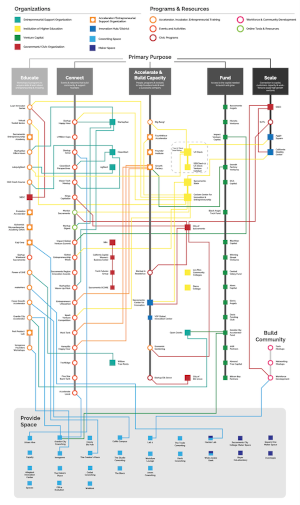
I’ve been working for myself for 9 years now, and like any zestful entrepreneur, have rushed headlong into crazy situations because I thought there would be a massive way to change the world and get rich. Usually, there was just an opportunity where I could make a few bucks. Some might disagree, but I say that a pinch of naiveté is one of those necessary ingredients entrepreneurs need in starting any new venture.
I said just a pinch – not a whole cup – and that lessons come at the end of a whole lot of mistakes and business relationships that didn’t work out. Over the last 9 years, I’ve tried working with ten partners on different ventures, and I have retained only two of those (or they were the only ones that were crazy enough to stick around).
This post is about the lessons I’ve learned when working with others. My hope is that you can avoid some of the pitfalls of collaboration before you find yourself learning in the same manner I did: The Hard Way.
1. Understand what you (and they) mean by ‘co-founder’ or ‘partner’ or ‘start a business together’
Miscommunication happens all the time, and conversations with these words in them are subject to confusion as well. We use words like partner, collaboration, and co-founder, but they mean very different things to each of us. In the same conversation, ‘partner’ may mean full-on equity sharing to one person and sharing email address lists to another. “Co-Founder” may mean living in the same house to one, and living in the same house while working on a business to another.
Even though it may seem silly at first, it’s a good idea to share your definitions of co-founder or partner with each other. They seem like common sense words, but their meanings are subjective and carry a lot of expectations with them. Getting to the root of what they mean to another person is like communicating emotions: I can state that I feel angry, but I’m really feeling agitated, fearful, and anxious over a customer’s review. For simplicity’s sake, I just say that a customer pissed me off. But drilling down into the particular emotions I feel get at the root of the problem and allow me to cool off sooner. By the same token, understanding a few vocabulary nuances in the beginning may save you and your future workmate a lot of butthurt later.
2. Leverage makes compromise possible
Similar to considering a prenuptial agreement before getting married to a spouse, at some point you’ll want to formalize an operating agreement with your partner. But in the beginning, it’s discovering actual existing leverage that matters.
The third partner I ever worked with spoke enough English for us to communicate, though I spoke very little Arabic. Our vendors are Iraqi, and our customers are American. We forged a partnership because he needed a Biz Dev partner and I needed an Implementation partner.
Our deal? 50/50, straight down the middle. He implemented the technical solution, and I did the Biz Dev. As the customer facing partner, I would receive complaints about the service being down (it was internet service in Baghdad, Iraq, so outages were normal), and as far as the customers knew, I was the one to fix it.
There was a day when everything was going wrong on the network (both the customer and technical sides), and I was insistent that he fix my problem first. This led to a flare-up in tempers, and before I knew it, we clashed. The fight ended with him leaving the office and saying he was finished. I immediately started thinking about how to replace him.
After a few, very long hours had passed, we saw each other again. We realized we had made mistakes on both our ends. Now here’s the thing: not only did we have language as a barrier, but we had philosophical and cultural differences that threatened to tear us apart at every turn. His religion was different than mine. His way of treating people is different than mine. What’s normal for me is definitely not normal for him. So it should have never turned into the successful partnership that it did, by all rights.
What kept us glued together was our interdependence. Without him, I had no service. Without me, he had no customers. So we naturally looked for ways to bridge our interpersonal gaps.
3. Test expectations often and early
In dating, two folks get together often for a couple different reasons – to see if there is compatibility, an emotional spark, or if there is potential to grow together. In each date, the conversation progresses a little further and subjects like kids, marriage, and career come up.
Working with others in business transactions may seem low risk and easy to do at first by comparison. But what happens when you start working with someone and find out that their work ethic is different than yours? Or that they have different life priorities than you, which cause them to put the project second?
I have learned that some upfront skin in the game is a good way to vet a potential partner. It doesn’t have to be money, since starting out, everyone’s poor (or so they’d have you believe). But there is other currency that works: time, evidence of relationships, or evidence of commitment. So yeah, it’s ok to call your partner on his or her claims of willingness and ask for a little collateral up front. If they’re serious, it’s not a big deal. If they’re not serious, they may hem and haw, which is a signal to you: walk away.
How to proceed

Despite all the pitfalls, a good partnership can last for a very long time. It is usually better to work with others than alone, and if successful, the project is likely to get too big for one person to handle anyway. Rather than trying to find a one-off co-founder or project partner, however, try to always be on the lookout for people you’d like to work with. If you do find someone you think is suitable, have a few talks with her and see if there is mutual interest and ambition.
Then, run the idea by several trusted people or mentors – they may help you to see past the initial excitement, or may have experienced your would-be partner a different way.
If you decide to proceed together, set up the relationship tentatively, so that you can both run a few small tests working together. Complete a small, low stakes, project that has a definite end point. Review how things go once in the middle and once in the end.
If that goes well, add money to the mix on another low stakes project. It will change the game a little and you’ll get a closer look at how you and your work-mate really are together.
Then, get a few contracts going (easier said than done, yes) and see what you need to do to make it work. If you can pull this off with another person and you’re still together by the end of it, then get ‘hitched.’
So I’m good now, right?
It’s not a 100% guarantee that your work relationship will pan out if you do it this way, but it’s at least a method. Sometimes you just get lucky. Most of the time, you don’t. Spending a little time up front is guaranteed to save you significant heartache and years wasted, however.
To learn more about starting a business, customer validation, or just business in general, visit theleaninnovator.com/infographic














